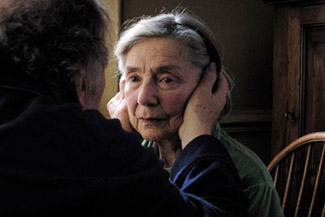Movie Review: Amour
By Matthew Huntley
December 17, 2012
BoxOfficeProphets.com

That’s why Amour (love) is the perfect title for Michael Haneke’s heartrending and shattering new film. I write “heartrending” and “shattering” but I’m actually at a loss for words on how to describe this film’s effect. It’s sad, emotional, and above all truthful, but these are only adjectives, which hardly encapsulate the experience of seeing it. To really appreciate this film, one need simply go into it with an open heart and watch. Haneke and his actors take care of the rest.
The story is really very simple. Georges (Jean-Louis Trintignant) and his wife Anne (Emmanuelle Riva) are two retired music teachers in their 80s. They live in a spacious, high-ceiling apartment in Paris and are still active in the community (the film opens with them attending the concert of a former pupil). One morning at the breakfast table, without warning, Anne goes into a lethargic state. She’s silent and unresponsive, staring blankly into space. Georges figures she’s pulling a prank, but when she finally comes to, she has no recollection of what just happened.
A doctor’s visit reveals she suffered a stroke due to a blocked artery and will require surgery, but the subsequent procedure leaves the right side of her body paralyzed and she must now depend on Georges, who’s slow and feeble himself, to care for her. Suddenly, their lives have completely changed. Anne requires a special bed, a wheel chair and almost 24-hour care. Her primary concern is that she’ll become a burden to Georges, which he of course dismisses as silly, but despite that, she makes him promise never to bring her back to the hospital. Her only wish is to stay in their apartment.
From here, Haneke makes us witnesses to the couples’ day-to-day pain and hardships. An underlying question throughout the film is whom the situation is harder on, but it wisely never suggests an answer, probably because there is no answer. Although Georges hires a nurse, Anne’s condition takes its toll on his physical and mental health, not least because he must watch as the love of his life turns into a “defenseless child,” whose mind and body start to give way to old age. His daughter Eva (Isabelle Huppert) says they have to do something, but Georges asks her directly, what can be done? Would it make logical sense for Anne to live with Eva? What benefit would Anne gain by moving into a hospital or nursing home? Eva would like to think her mother might get better, but deep down she knows her condition is irreversible.
So does Anne, who grows tired and impatient with herself. After she suffers another stroke, she begins to speak nonsensically and refuses life’s basic ingredients like water. It’s clear she doesn’t want to live like this anymore and if she had the means and will power to end her own life, she probably would and we’d have no reason to blame her.
One of the best things Haneke does with Amour is resist turning its unadorned yet powerful story into wrought melodrama. A lesser movie might have dressed it up with flagrant symbolism or easy emotional buttons. But Haneke opts for naturalism, and by making the audience a quiet observer of their behavior, we come to fully empathize with Georges and Anne’s situation. Haneke employs long takes, diegetic-only sound and neo-realistic, non-functioning scenes to give it the flavor of real life. Why is this approach particularly striking? Why does it engage us? Because it triggers within us either a memory or speculation of something similar in our own lives, which makes it personal. Who among us hasn’t been a witness to a friend or loved one nearing death? This is something that’s universal among human beings, and even if we haven’t experienced it directly, the film at least reminds us of our own mortality and fragility. There’s a heartbreaking scene when Anne sifts through her old photographs and recalls how beautiful life is, reminding Georges and us just how fast it passes us by. On that level, the film is downright frightening.
The performances are beyond comparison. Trintignant and Riva, whom I’ve never had the pleasure of watching before, fulfill the roles of husband and wife, caregiver and patient so naturally we have to remind ourselves they’re actors. They embody Georges and Anne in their minds and hearts, and while it seems like the solemn material would call forth inevitable dramatic grandstanding, Trintignant and Riva suppress the urge.
It’s been said Haneke experienced a situation like Georges and Anne’s in real life. Honestly, I would be surprised if he hadn’t. Would a filmmaker have been able to capture its essence without having lived through it him or herself? I’m not sure it’s possible because it seems only firsthand truth could make this story so rich and pithy.
Amour is a film that touches us on a deep, inward level, so much that we ponder our own existence. Yes, the subject matter has a lot to do with it, which inherently calls for this type of response, but just because it calls for it doesn’t necessarily make it a given. It’s Haneke’s approach and the actors’ superb performances that flesh it out. They convince us love is not an intangible concept, but something that’s very real, for better or worse.